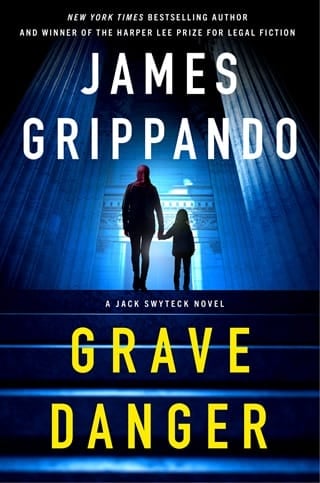Chapter 7
Jack went straight from the courthouse to Theo’s club in the heart of Coconut Grove. Cy’s Place didn’t open until noon, but
Theo was already at work behind the bar, preparing for the lunch hour. Jack took a seat on a cushioned barstool.
“What’re you drinking?” asked Theo, wiping down the bar top.
Even when empty, Cy’s Place oozed that certain vibe of a jazz-loving crowd. Creaky wood floors, redbrick walls, and high ceilings
were the perfect bones for Theo’s club. Art nouveau chandeliers cast just the right mood lighting. Crowded café tables fronted
a small stage for live music.
Cy’s Place was special for Jack, and not just because it was the club Theo had told his lawyer he would own someday, if ever
he got off death row. At the grand opening, on a pair of barstools that drew closer together as the night wore on, sparks
had begun to fly for Jack and FBI agent Andie Henning. They’d talked and laughed till 2:00 a.m., listening to Theo’s Uncle
Cy give them a taste of Miami’s old Overtown Village through his saxophone. A few months later, beneath a banner announcing
the second anniversary of jack’s 39th birthday , Jack had popped the question.
It seemed like yesterday; it seemed like so long ago.
“Just water,” said Jack.
Theo reached for a water glass, and Jack popped a question of a different sort.
“Dude, did you forget to tell me about a little encounter you had with Zahra’s ex-husband this weekend?”
Theo placed the water glass on a coaster and smiled thinly. “I don’t think Farid will be bothering you anymore.”
“Damn it,” Jack said, groaning. “Your little stunt blew up in front of the judge this morning. Please tell me you didn’t hunt
this guy down.”
“Nope. He came by the club last night. Sat right where you are and drank a glass of mango juice, neat.”
“Came here why? And how’d you even know it was him?”
“He introduced himself. And obviously he didn’t come for the mango juice.”
Jack drank his water. “What did he say?”
“He said he knew someone jumped you outside your office, and he knew I was Zahra’s bodyguard. How he knew all those things
I don’t know.”
Jack had told no one but the State Department, which sent his mind racing. But he brought himself back to Theo.
“Why would he tell you that?”
Theo shrugged. “I assumed it was his way of saying he knows everything. His way of intimidating Zahra and making her feel
like she’ll never be safe—he can always find her. I just kept the whole thing to myself so she didn’t get all freaked out.”
“Are you saying that was the end of the matter?”
“Well, not exactly. When he got up and went to the men’s room, I followed him.”
“Into the men’s room?”
“Yeah. I kinda locked the door.”
“Oh boy,” said Jack. “Do I want to hear this?”
“I set him straight.”
“Theo, what did you do?”
“Didn’t have to do nothin’. He was scared shitless.”
“What’d you say to him?”
“I told him there’s two things I hate more than anything in this world: men who abuse their wives and kids, and men who show
up at my best friend’s law office and threaten him. Then he just started blabbering.”
“Blabbering what?”
“He said he didn’t come into my club to intimidate Zahra or anybody else. Said he never abused Ava, Zahra, or his daughter.
He even denied he roughed you up outside your office.”
“Of course he denied it,” said Jack. “Abusers always do.”
“That was my reaction too. At first.”
“Do you have some other impression now?”
“I’ve seen a lotta punks so scared they’ll say anything. You grow up on the street, you kinda develop a knack for telling
when they’re feeding you bullshit and when they’re not.”
“What’s your take?” asked Jack.
Theo’s expression turned very serious. “I’m not sure Farid’s lying.”
Andie walked down the hall to the kitchen for coffee, but she found cake. It was the tenth anniversary of the opening of the
FBI’s state-of-the-art field office, which of course called for sheet cake with red, white, and blue icing. One sheet cake
for one thousand employees in a 330,000-square-foot facility situated on twenty acres. First come, first served. Andie had
never known the old field office, so she only grabbed coffee and left the cake for the more deserving agents and staff who’d
endured the month-long move from North Miami Beach.
“Henning, I need you,” her ASAC said. He’d come to the kitchen for cake and found Andie. She followed him out.
Todd Tidwell was the newest assistant agent in charge, one of three in south Florida, having transferred from the Chicago
office, which had reportedly celebrated with two sheet cakes upon his departure. Andie was doing her best to get used to his style, which included annoying little things like
walking ahead of Andie, not with her, to his office, as if he were King Charles and she were Camilla.
Tidwell closed the door and told her to pull up a chair for a videoconference. A man and a woman appeared on the forty-inch LCD screen on the wall. Tidwell introduced Andie to division directors Comstock and Davis from the State Department. Davis, director for the Eastern Hemisphere, did the talking.
“Agent Henning, we had a videoconference with your husband yesterday.”
Andie was taken aback. It would have been nice to have a heads-up from her ASAC that this was about Jack, but she rolled with
it. “Oh? Jack didn’t mention it.”
“How much do you know about his case under the Hague Convention for Zahra Bazzi?”
She assumed the division chief had no idea that the question of what Andie knew or should know about Jack’s cases had landed
them in marriage counseling. “I know very generally that Jack is trying to stop an abusive husband from using the US court
system to take a little girl away from her mother.”
“Two years ago,” said Davis, “Zahra’s sister, Ava Bazzi, disappeared after Iran’s morality police arrested her at a hijab
protest. The Iranian government says she escaped and is still alive.”
“Others say she was murdered by the morality police,” said Andie. “I do follow the news.”
“As we explained to your husband, Ava Bazzi’s disappearance is a very sensitive issue right now in US-Iranian diplomatic relations.
It would be most unfortunate if Zahra Bazzi’s Hague proceeding turned into a political football about Ava Bazzi.”
“What did Jack say?”
“He hung up on us.”
Andie’s heart sank. “Maybe you got disconnected.”
“No. He told us that our opinions don’t matter, and he hung up.”
Andie’s gaze was fixed on the LCD screen, but she could almost feel the look of disapproval from her ASAC. She suddenly felt
the need for damage control.
“Director Davis, all I can tell you is that Jack is a good lawyer. He wouldn’t inject Ava Bazzi into Zahra’s case just to
make trouble or grab headlines.”
“It’s already an issue. There were protests outside the federal courthouse this morning. The Iranian government’s fear is that Ava Bazzi is becoming a launchpad to revive international outrage over thousands of other arrests that, for whatever reason, the world simply stopped talking about. Media coverage so far indicates that the demonstrators’ strategy is working.”
“I’m having a hard time seeing how international awareness of government oppression is a bad thing,” said Andie.
“It’s not. You’re missing the point. Every movement needs a face. If your husband’s case makes Ava Bazzi that face, the Iranians
are going to hold us accountable. Our negotiations with the Iranians will be dead in the water.”
“I’m sure your negotiations are very important,” said Andie. “But it might help me understand things better if you could tell
me something about them.”
There was complete silence, which left Andie feeling less than convinced.
“Look,” said Andie, “just because the demonstrators and the media are making Ava Bazzi the face of a new wave of opposition
to the Iranian regime doesn’t mean Jack will make his case about Ava Bazzi.”
“It’s unavoidable,” said Davis. “The State Department has been in communication with lawyers for both sides. Farid Bazzi’s
lawyer has a silver bullet argument that Zahra has no rights under the Hague Convention because her marriage to Farid was
a fraud. It could end the case on day one. But if the judge doesn’t buy the argument, or if he defers ruling on it and the
case moves forward, Farid’s lawyer has made it crystal clear that Farid intends to prove that Ava Bazzi is alive.”
“Why would he do that?” asked Andie.
“Perhaps to curry sympathy with the judge by showing that Ava Bazzi abandoned her husband and their daughter. Perhaps to curry
the support of the Iranian government by taking a position that is consistent with the official position of the Iranian regime.”
“Or maybe the Iranian government is forcing Farid to take that position,” said Andie. “Especially in light of today’s protests.”
“Whatever the reason, this case is on a fast track to becoming a flashpoint in US-Iranian relations,” said Davis.
Andie could see where the conversation was leading, and she wasn’t comfortable with it. “Have you made that clear to Jack?”
“Yes. To no avail. We thought it would help if he heard it from you.”
The response caught in Andie’s throat. “I can’t tell Jack how to handle his case.”
“We understand,” said Davis. “And this is not an order. We simply ask that you communicate a message to your husband.”
“What message?” she asked with trepidation.
“One, no one will ever be able to prove that Tehran’s morality police murdered Ava Bazzi. Two, by trying to prove the unprovable, he’s only hindering
the US government’s ability to negotiate.”
“Again, I have to ask: Negotiate for what?”
Tidwell spoke up. “Henning, you’re not even close to having the level of clearance needed to hear the answer to that question.”
The State Department officials seemed put off by the ASAC’s ham-handed approach. Davis rephrased it. “Agent Henning, we can
assure you of this much: for the sake of your country, it is critically important that you communicate our message to your
husband.”
Never in her tenure with the bureau had the US government asked Andie to communicate with Jack about an active case. But if
it was true that Jack had actually hung up on the State Department, telling them that now was not a particularly good time
wasn’t going to help matters.
“I’ll give it serious consideration,” she said, committing to nothing.
It was after 10:00 p.m., and Jack was still in his office with Zahra.
The mini trial on the threshold issue in the case—the legitimacy of Zahra’s marriage to Farid—was less than twelve hours away.
They were short on time to prepare. Jack was even shorter on time to provide Zahra with the needed assurance that the American
system of justice wasn’t stacked in favor of men—at least not to the extent of the Iranian system.
“Do you think the judge will let the imam testify about things I told him in private?” she asked.
“He shouldn’t,” said Jack. “I made it clear this morning that we will assert the ecclesiastical privilege.”
“I didn’t ask if he should protect my confidences. I’m asking if you think he will .”
It was a fair question—whether a cranky old federal judge who’d never set foot in a mosque might decide that confidences were
somehow entitled to less protection because the religion was something other than his own.
“My expectation is that Judge Carlton will do the right thing,” said Jack. “But in case I’m wrong, let me ask you this: Is
there anything you told the imam that worries you?”
Zahra took a moment. The moment turned into a minute. The minute dragged on.
“Not that I can think of,” she said finally.
Jack arched an eyebrow. “Are you sure?”
There was another pause. “Yes.”
“When I was at your house the other night, you indicated that you married Farid to protect Yasmin.”
“Is that what you heard me say?” asked Zahra. “You may have misunderstood.”
“I’m pretty sure I didn’t,” said Jack, absolutely certain that he hadn’t.
“Whatever you may have heard, all I meant is that I married Farid because a little girl needs a mother. Is that fraud? Is
that a marriage under false pretenses? I don’t think so. Do you?”
Jack knew spin when he heard it. “Zahra, it’s late, so let’s take the shine off the penny. Between lawyer and client: If I
asked you whether you made the decision to abduct Yasmin and leave Iran before you even married Farid, what would your answer
be?”
She dug her car keys from her purse and rose from the chair. “My answer would be, ‘Don’t ask me that question.’”
Their eyes locked a moment—nothing confrontational, just an understanding between the two of them. Jack laid his notepad aside,
choosing not to write anything down.
“Fair enough,” he said, rising. “I’ll walk you out to your car.”
 Fullepub
Fullepub 



